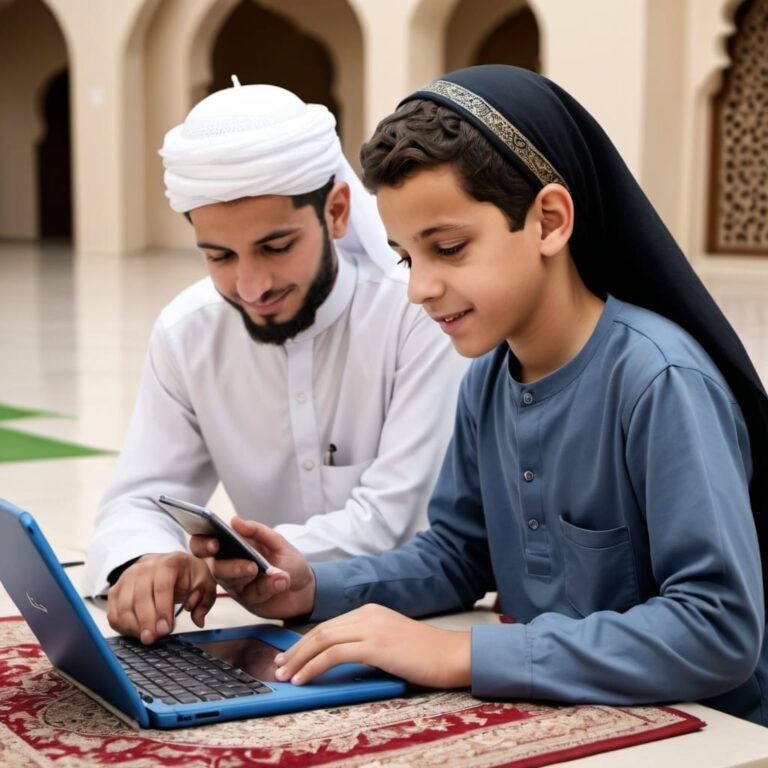Dining with Grace Understanding the Ethics and Etiquette of Eating in Islam
In Islam, every issue of existence is guided through standards and manners, and consuming is no exception. Understanding those ethics and etiquettes is critical for the Muslim network, as it reflects one’s adherence to religion and admire for the benefits supplied by using Allah. This weblog submit targets to explore the profound importance of eating etiquette in Islam, imparting insights, sensible tips, and addressing commonplace inquiries to assist Muslims deepen their expertise and exercise these principles in every day existence.
Understanding the Islamic Perspective on Eating Habits
Eating is a primary human need, yet in Islam, it is also an act of worship. Muslims are encouraged to devour with mindfulness and gratitude, spotting that every morsel is a blessing from Allah. The Quran and Hadith provide guidance on the way to method meals, emphasizing moderation, cleanliness, and the goal in the back of eating. The Prophet Muhammad (PBUH) stated, “The son of Adam does no longer fill any vessel worse than his belly. It is enough for the son of Adam to consume some mouthfuls to maintain him going.”
Islamic teachings encourage Muslims to consume halal (permissible) and tayyib (natural) meals, averting whatever that can damage their frame or soul. This angle fosters a experience of duty and recognize toward food, making sure that ingesting stays a spiritually enriching experience.

Key Etiquette of Eating in Islam
Islamic consuming etiquette is derived from the Sunnah of the Prophet Muhammad (PBUH). Here are a few key practices:
Saying Bismillah Before Eating
Muslims are encouraged to begin their meals through announcing “Bismillah” (In the call of Allah). This easy word serves as a reminder to acknowledge Allah’s blessings and express gratitude earlier than ingesting meals.
Using the Right Hand
The Prophet Muhammad (PBUH) emphasized the significance of the usage of the proper hand at the same time as ingesting, as it is considered purer and cleanser. He said, “When someone of you eats, let him devour together with his right hand, and while he liquids, permit him drink with his proper hand, for the satan eats with his left hand and beverages with his left hand.”
Eating in Moderation
Islam teaches moderation in all aspects of life, together with ingesting. Overindulgence is discouraged, and Muslims are cautioned to prevent eating earlier than they sense completely complete. This exercise not only promotes physical fitness however also religious properly-being.
The Significance of Sharing Meals in the Muslim Community
Sharing food is a deeply rooted subculture in Islam, reflecting the values of generosity, network, and brotherhood. The Prophet Muhammad (PBUH) stated, “The meals of one man or woman is sufficient for 2, the meals of human beings is enough for four, and the food of four people is sufficient for 8.”
Strengthening Bonds
Eating together fosters a sense of team spirit and strengthens social bonds in the Muslim network. It creates possibilities for significant conversations, mutual support, and the sharing of benefits.
Feeding the Needy
Charity holds a unique place in Islam, and feeding the less fortunate is a surprisingly meritorious act. The Quran encourages Muslims to share their meals with the ones in want, stating, “And they give food in spite of affection for it to the needy, the orphan, and the captive” (Quran 76:eight).
Celebrating Together
Sharing meals in the course of special events, which include Ramadan and Eid, brings the network together in party and worship. These gatherings fortify the values of gratitude, generosity, and team spirit.
Fasting and Its Role in Shaping Eating Ethics
Fasting is a essential pillar of Islam, observed primarily for the duration of the holy month of Ramadan. This practice drastically impacts a Muslim’s technique to eating and strengthens their moral and religious field.
Developing Self-Control
Fasting teaches willpower and discretion, as Muslims abstain from food and drinks from dawn till sundown. This discipline extends beyond Ramadan, encouraging aware ingesting habits for the duration of the 12 months.
Enhancing Gratitude
Experiencing starvation all through fasting fosters empathy for folks who face food lack of confidence each day. It deepens gratitude for the blessings of food and promotes a greater appreciation for Allah’s provisions.
Building Community Spirit
The communal component of fasting, together with breaking the fast together (iftar), reinforces the sense of belonging and harmony inside the Muslim community. It offers an possibility to percentage meals and aid each other in worship and reflection.
Common Misconceptions approximately Eating Etiquette in Islam
There are several misconceptions surrounding Islamic eating etiquette. Addressing those misunderstandings can help make clear the real essence of these practices.
Misconception 1: Halal Food is Limited
Some trust that halal meals alternatives are restricted. In reality, halal encompasses a huge sort of ingredients, provided they meet the criteria set by means of Islamic law. This includes fruits, veggies, grains, and permissible meats.
Misconception 2: Islamic Eating Etiquette is Rigid
Islamic consuming etiquette is frequently perceived as rigid and restrictive. However, these hints are designed to enhance the consuming enjoy, selling fitness, cleanliness, and mindfulness.
Misconception 3: Eating with the Right Hand is Outdated
The practice of consuming with the right hand may appear previous to a few, but it’s far rooted inside the concepts of cleanliness and admire. It serves as a consistent reminder of the ethical dimensions of ingesting.
Modern Challenges and Adhering to Islamic Eating Ethics
In the short-paced contemporary world, adhering to Islamic ingesting ethics can be hard. However, with conscious effort and some modifications, it is possible to keep these standards.
Busy Lifestyles
Modern existence often lead to moved quickly and bad ingesting conduct. To counter this, Muslims can plan their food, prioritize home-cooked food, and set apart time for mindful eating.
Dining Out
Eating out poses demanding situations in making sure meals is halal and prepared according to Islamic guidelines. Researching restaurants, asking approximately components, and opting for vegetarian or seafood alternatives can help maintain dietary integrity.
Social Pressures
Social gatherings and peer strain can occasionally cause compromising Islamic eating ethics. Staying firm in a single’s ideals and with politeness explaining dietary picks can help uphold these values.
Practical Tips for Incorporating Islamic Eating Etiquette into Daily Life
Integrating Islamic consuming etiquette into day by day life calls for aware practice and consistency. Here are a few realistic hints:
Meal Planning
Plan meals beforehand of time to make certain they align with halal and tayyib ideas. This helps in making healthier picks and reduces reliance on processed meals.
Mindful Eating
Practice mindfulness whilst consuming with the aid of that specialize in each chew, savoring the flavors, and expressing gratitude. Avoid distractions together with tv or smartphones during food.
Educate and Involve Family
Educate own family contributors, in particular youngsters, approximately Islamic ingesting etiquette. Involve them in meal instruction and discussions approximately the moral and religious factors of meals.
FAQs Answering 20 Frequently Asked Questions on Eating in Islam
- What is the significance of announcing Bismillah earlier than ingesting?
Saying “Bismillah” recognizes Allah’s blessings and expresses gratitude for the food provided.
- Why is it vital to consume with the proper hand in Islam?
Eating with the right hand is considered purer and cleanser, following the Sunnah of the Prophet Muhammad (PBUH).
- What foods are considered halal in Islam?
Halal foods include permissible meats (organized consistent with Islamic regulation), culmination, greens, grains, and sure dairy merchandise.
- How does fasting effect a Muslim’s consuming behavior?
Fasting instills willpower, complements gratitude, and fosters a experience of network, influencing mindful consuming habits.
- Can I consume at non-halal eating places?
It is beneficial to investigate and choose restaurants that offer halal options or choose vegetarian/seafood dishes.
- Is overindulgence in food discouraged in Islam?
Yes, Islam teaches moderation and advises in opposition to overindulgence to preserve bodily and religious well-being.
- What is the role of sharing food in Islam?
Sharing meals strengthens social bonds, promotes generosity, and fosters a experience of network.
- How can I make certain my meals is tayyib (natural)?
Choose fresh, unprocessed foods, and avoid ingredients which could damage your frame or soul.
- What should I do if I forget to mention Bismillah earlier than eating?
If forgotten, say “Bismillah fi awwalihi wa akhirihi” (In the name of Allah, in its starting and stop) after the first bite.
- How can I train my youngsters approximately Islamic ingesting etiquette?
Involve them in meal preparation, give an explanation for the significance of those practices, and lead by means of instance.
- Are there unique prayers to mention after eating?
Yes, announcing “Alhamdulillah” (All reward is because of Allah) after consuming expresses gratitude for the meal.
- What is the importance of fasting in Islam?
Fasting is a method of non secular purification, strength of will, and empathy for the much less lucky.
- Can I eat meals organized by using non-Muslims?
Yes, as long as the food meets halal and tayyib criteria.
- How does Islam cope with food wastage?
Islam discourages losing food and encourages aware intake and sharing with others.
- Is it permissible to consume with utensils in Islam?
Yes, consuming with utensils is permissible, however using the proper hand remains essential.
- What is the importance of breaking the short with dates?
Breaking the short with dates follows the Sunnah of the Prophet Muhammad (PBUH) and presents short electricity.
- How can I include Islamic ingesting etiquette while visiting?
Plan ahead, studies halal options, and bring snacks that align with Islamic suggestions.
- Can I drink water all through meals?
Yes, however it is endorsed to drink water in moderation to avoid overfilling the belly.
- How do I manage social gatherings that don’t observe Islamic consuming etiquette?
Politely explain your nutritional alternatives and are looking for alternatives that align with your ideals.
- What are the blessings of conscious eating in Islam?
Mindful eating promotes gratitude, enhances the ingesting experience, and aligns with the moral and religious concepts of Islam.
Conclusion and Next Steps
The ethics and etiquette of ingesting in Islam are quintessential to a Muslim’s every day existence, fostering gratitude, mindfulness, and network. By understanding and training these standards, Muslims can decorate their spiritual and physical well-being even as honoring the blessings provided by way of Allah.
For the ones in search of similarly steering, recall enrolling in on-line Quran training or in search of recommendation from knowledgeable students. Additionally, attractive with the Muslim community and participating in shared meals can deepen your know-how and appreciation of these practices.
Ready to explore greater approximately Islamic teachings and decorate your spiritual journey? Visit Learn Quran Online to hook up with professional tutors and improve your information.









